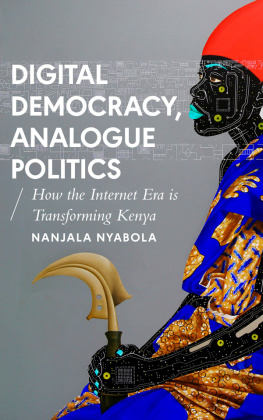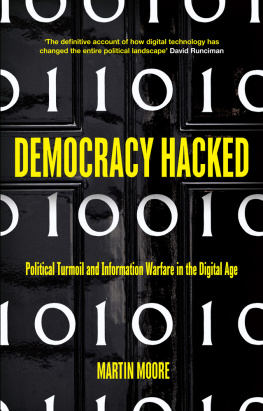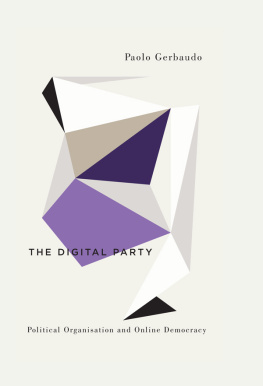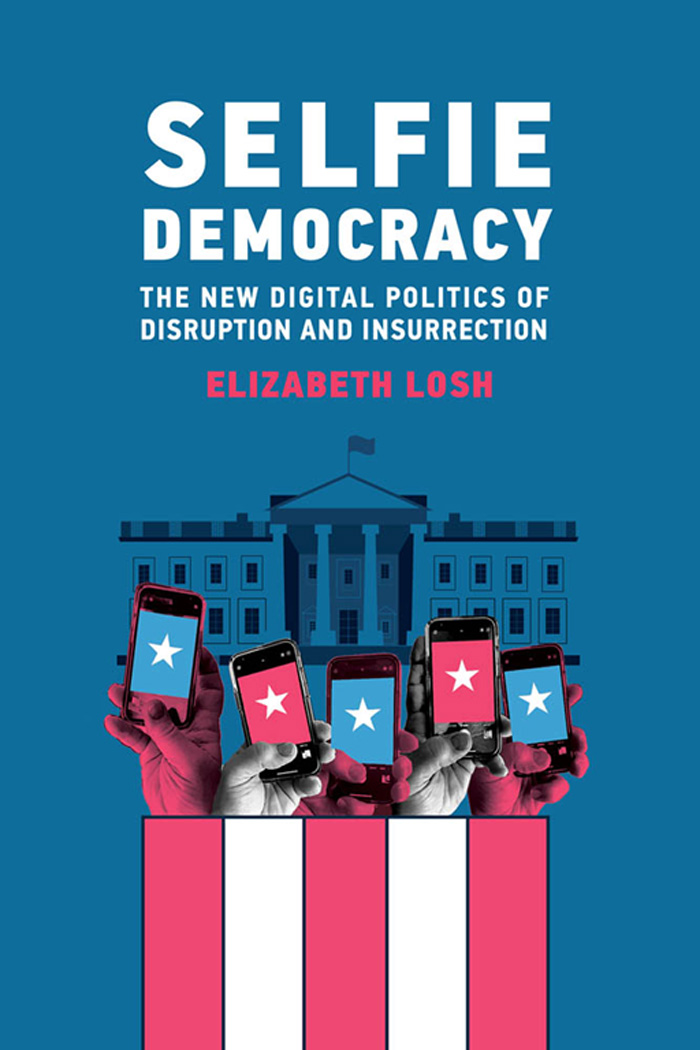
Selfie Democracy
Selfie Democracy
The New Digital Politics of Disruption and Insurrection
Elizabeth Losh
The MIT Press
Cambridge, Massachusetts
London, England
2022 Massachusetts Institute of Technology
All rights reserved. No part of this book may be reproduced in any form by any electronic or mechanical means (including photocopying, recording, or information storage and retrieval) without permission in writing from the publisher.
The MIT Press would like to thank the anonymous peer reviewers who provided comments on drafts of this book. The generous work of academic experts is essential for establishing the authority and quality of our publications. We acknowledge with gratitude the contributions of these otherwise uncredited readers.
This book was set in ITC Stone Serif Std and ITC Stone Sans Std by New Best-set Typesetters Ltd.
Library of Congress Cataloging-in-Publication Data is available.
ISBN: 978-0-262-04705-0
10 9 8 7 6 5 4 3 2 1
d_r0
For Mel Horan
Contents
Introduction: Unwiring Democracy
In a candid photograph taken at the G8 Summit in 2010, several of the worlds most powerful leaders peered at a device in President Barack Obamas hand (figure 0.1). Although his BlackBerry, which allowed remote access to email and the internet, was hardly a novelty by then, there was great global interest in emulating his new digital politics.
Others were watching Obamas BlackBerry closely, too. A journalist described the presidents phone as a symbol of hard-working, tech-obsessed professionals that connected Obama with his political base, just as Reagans cowboy hat represented ties to rural voters.
Years later, Obama would laugh about the BlackBerrys eventual obsolescence and the limitations of using mobile tools designed to conduct secure communication. Good news Mr. President, were going to give you a smartphone instead of a BlackBerry, Obama said during an appearance on The Tonight Show. Im excited, I get the thing, and theyre like, Well, Mr. President, for security reasonsthis is a great phone, state-of-the-artbut it doesnt take pictures, you cant text, the phone doesnt work, you know, you cant play your music on it. Comparing his spy-proof gadget to a toy phone that a three-year-old might use, Obama expressed envy for the much greater functionality that his teenage daughters enjoyed with their everyday smartphones.
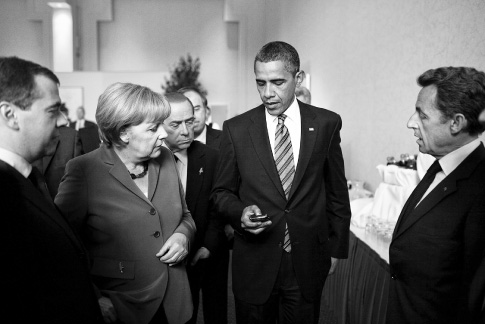
Figure 0.1
Barack Obama at the G8 Summit in Muskoka, Canada on June 25, 2010, surrounded by French President Nicolas Sarkozy, German Chancellor Angela Merkel, Russian President Dmitry Medvedev, and Italian Prime Minister Silvio Berlusconi. Official White House Photo by Pete Souza.
Of course, taking pictures, texting, and playing music on a smartphone were already political acts. The smartphone continues to serve as a major vehicle for civic expression and partisan influence. For many citizens, it has also become their main interface with the state. Because of this transformation, digital literacy and ideological persuasion are inextricably linked.
The president of the United States gives speeches, answers questions at news conferences, and signs legislation with the smartphone secured out of sight, but the device has become a political actor in its own right, thanks to social media. As a consumer of these technologies, the president reinforces certain cultural assumptions about the power of smartphone use. These assumptions perpetuate myths about connection, transparency, participation, and access. These myths are further amplified in rhetoric borrowed from Silicon Valley about how these technologies supposedly strengthen social bonds, enable exploration, encourage engagement, and overcome barriers.
Barack Obama and Donald Trump are usually cast as ideological opposites, but, during their presidencies, they were both seen as strongly attached to their non-human companions. Obama might have been the anti-Trump and Trump the anti-Obama, but they both used mobile computing in ways that redefined the office of president. Now such devices have become difficult for any world leader to renounce.
Mobile media-making and constant internet access have changed political engagement at all scalesfrom local regulations to international lawand transformed all branches of government. Not all of these changes have been for the better. Masked by the appeal of greater direct democracy, both tech companies and authoritarian figures have amassed power largely through image management and opinion framing rather than through a true broadening of civic life. The disruption promoted by tech companies to existing economic and social institutions inevitably destabilizes our political frameworks as well.
This book exposes the unintended consequences of wireless technologies on political leadership and shows how seemingly benign mobile devices that hold out the promise of direct democracy undermine representative forms of government. Trumps time in office is often viewed as a reaction to the Obama presidency, but Trump took up Obamas call to abolish intermediaries, and he followed it to its most extreme conclusions. For both men, the intermediaries that stood between the president and his people included elected representatives, professional diplomats, and high-profile journalists, along with the bureaucrats and middlemen long vilified in conventional political discourse. Trumps ideas about using technologies for connection, access, transparency, and participation might appear perverse in rewarding sycophancy, influence peddling, paranoia, and insurrection, but there is a logic that connects the two administrations that this book will trace.
This account of recent history offers a way for citizens to understand a common repertoire of digital practices acted out by users from both the right and the left and thus to rethink our contemporary state of political polarization and alienation. This is not to say that the right and the left do not offer different moral visions when it comes to ever-present digital communication. Democrats have insisted that Republicans are too nostalgic for the past and too slow to adapt, while Republicans have accused Democrats of loving new technologies too uncritically and promoting left-coast values in the process. Furthermore, these contrasting ideologies present very different imagined users who reflect cultural stereotypes that are rooted in identity politics. As this book will show, attitudes about technology tend to reflect a political groups particular anxieties about class, gender, and race.
Interestingly, when it comes to race, both political parties tend to share what Andr Brock has called a deficit perspective on minority technology, in which people of color are assumed to be lacking in skills and resources. Liberals argue for retraining and redistribution, and conservatives complain about overreach and handouts, but both center the assumption of Silicon Valley engineersmost of whom are white, male, and affluentthat the underprivileged are incompetent.
Despite differences between types of technology users, certain universals about technology use persist. User experiences like taking pictures, texting, and playing music are designed to be the same. The interchangeable interfaces of social media platforms encourage similar attitudes across the political spectrum regarding online citizenship.
These platforms remind all users, regardless of party affiliation, to give constant attention to their feeds. As users become familiar with what content generates likes, comments, and shares from the people that they care about, they make common risk/reward calculations about what to post to maximize engagement within their social circles. Thus, mobile devices and social media incentivize citizens to perform attention-getting acts of political self-expression and encourage feelings of direct contact with powerful leaders, who might appear as notable characters in their digital lives. These political leaders often seem to share their constituents disapproval of intervening gatekeepers, who seemingly want to reinforce traditional barriers between the electorate and the elected. By contrast, journalists and elected officials who amplify the leaders messages uncritically are rewarded with celebrity status and larger audiences.
Next page



